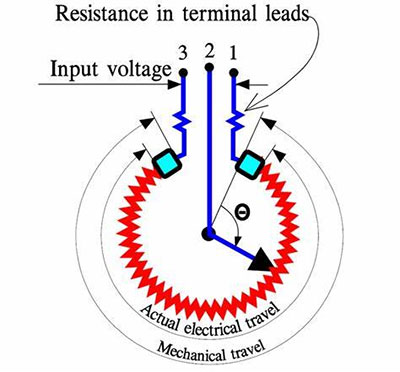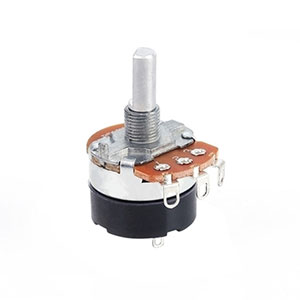What is a Potentiometer?
The potentiometer, as a precise measurement tool in the field of electronics, stands out with its sophisticated structure, straightforward working principles, and widespread applications across various domains, making it an indispensable instrument in scientific research and engineering practices. In this article, ATO industrial automation will delve into the structure, working principles, advantages, and applications of the potentiometer, exploring its crucial role in modern technology and scientific research.
Structure of the Potentiometer
The basic structure of a potentiometer includes a resistive wire, a sliding contact, and a circuit for measuring potential difference.
- Resistive wire: It is typically made of a high-resistance alloy, ensuring uniform and controllable resistance characteristics.
- Sliding contact: it moved along the resistive wire through a mechanical mechanism, allows for the adjustment of the resistance in the circuit, enabling precise electrical measurements.
Working Principles of the Potentiometer
The operation of a potentiometer is based on the principle of potential division. When a voltage is applied to the resistive wire, the movement of the sliding contact induces a change in resistance within the circuit. By measuring the voltage difference across the two ends of the resistive wire, the potential difference at the sliding contact can be calculated. This potential difference is directly proportional to the position of the sliding contact on the resistive wire, making the potentiometer an extremely sensitive voltage measuring instrument.
Advantages of the Potentiometer
- High Precision: The potentiometer, with its simple structure and clear working principles, provides exceptionally high measurement precision, making it suitable for accurate potential difference measurements.
- Adjustability: The ability to adjust the resistance in the circuit by moving the sliding contact provides flexibility in controlling potential difference.
- Sensitivity: The potentiometer exhibits high sensitivity to potential variations, capable of detecting minute voltage differences, making it widely applicable in laboratories and research environments.
Applications of the Potentiometer
- Laboratory Measurements: Potentiometers find extensive use in laboratory settings for instrument calibration, measurement of circuit parameters, and calibration of potential differences and resistances.
- Electronic Circuit Design: In electronic engineering, potentiometers are employed for designing and debugging electronic circuits, ensuring system stability and performance.
- Electrochemical Research: Potentiometers play a crucial role in electrochemical experiments, measuring parameters such as battery potential and electrolyte concentration.
- Educational Applications: Potentiometers are essential tools in electrical education, aiding students in understanding fundamental concepts such as voltage and potential difference.
Significance of the Potentiometer in Electrical Research
The potentiometer plays an indispensable role in electrical research. By providing accurate potential difference measurements, it enables scientists and engineers to delve into the variations of electrical signals within circuits, thus propelling advancements in electrical research. Its applications in electrochemistry, materials science, and electronic engineering provide robust support in addressing modern technological and scientific challenges.
In conclusion, the potentiometer, as a precise electrical instrument, with its simple, sensitive, and highly controllable characteristics, provides a crucial means of electrical measurement for scientists, engineers, and students. Its widespread use in laboratories, engineering, and education underscores its irreplaceable position in advancing scientific and technological progress. With ongoing technological developments, the potentiometer will continue to play a unique role, bringing forth more innovations and possibilities in electrical research and engineering practices. Therefore, the potentiometer is not just an instrument; it represents an essential component of the artistry of precise electrical measurement.

